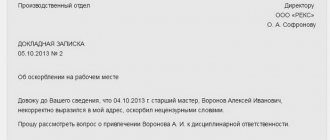Labor relations are often accompanied by conflicts within the team or with management. If they are accompanied by humiliation of honor and dignity in an indecent form, the law allows the perpetrator to be held accountable for insult at work. What to do if you have been insulted by your boss or colleague, and what liability the perpetrator faces - we will look at the answers to these questions in the material presented.
Basic moments
Insult – humiliation of dignity in any place, regardless of whether we are talking about the workplace or public places. Its presence may have a negative impact on the career of the culprit.
For example, if a teacher is humiliated in the presence of children, his authority will be negatively affected. This is largely due to the difficulty of re-establishing contact with students in the future.
The following can be considered an insult:
- obscene language;
- various offensive gestures;
- sending letters, distributing information on the Internet that is humiliating in nature.
If there are doubts about the presence of obscene language and insults, experts may be required when going to court.
It is their responsibility to determine the rules for using semantic language norms.
Evidence material
Any accusation requires objective confirmation, which may include:
- Eyewitness testimony.
- Data from CCTV cameras.
- Recording from a voice recorder turned on during the incident. Depending on the sound quality, you may be able to attach a transcript.
The investigation period should not exceed 1 month. 2 months are allotted for the consideration of the case. The court decision can be appealed within 10 days after the decision is issued.
Any questions you may have can be asked in the comments to the article.
Features of the crime
Many people, when confronted with abusers, threaten the offenders with criminal punishment. Such a threat can only be considered inertia.
Since 2012, the Criminal Code punishes only insulting a person in power. All others should contact the Administrative Code.
Concept and legal characteristics
The official situation of this offense is not considered in any separate section of the article. What exactly can be considered an insult? Two things are important here:
- the offender seeks to humiliate the dignity and/or honor of his victim;
- the actions of the perpetrator are clothed in some indecent form, that is, they “do not suffer” from the ethics of words and/or actions.
Such an offense must have a perpetrator and an addressee. This can be explained with a simple example.
Let’s assume that a client came to the company’s office with complaints and contacted an available manager. The issue was considered, but it was not immediately possible to resolve the problem.
If a client swears obscenely without addressing anyone, this will not be an insult to anyone present. And if the addressee is a specific employee present, he may regard this as an insult
Of course, it is also important what exactly the offender says/does
Here it is rational to turn to sociological research. They identified the offending factors empirically. The following may be considered offensive:
- all obscene or obscene expressions (usually swearing, swearing);
- various comparisons - for example, with animals or objects;
- unwanted, cynical touching;
- obscene gestures;
- movements that may result in clothing or part of it being torn off from the victim.
Read on to learn more about the signs and articles for insulting a person (an employee) in the workplace.
Composition of the crime and qualifying characteristics
In this case, it is more correct to talk about the elements of the offense. The circumstances of this act have already been discussed in the previous section.
It remains to add something important. Let’s imagine: a person is at work, and someone’s statement offends him
Has an offense taken place? Not really, since we are still talking about personal perception.
- Let’s say that employee Ekaterina was teased “Katyusha-piggy” as a child, after which she hated the specific diminutive form of her name. An uninitiated person can call an employee exactly that and thereby insult her. However, from the point of view of etiquette, we are talking here only about some familiarity; there is nothing obscene in the words of an unwitting offender.
- But if the interlocutor says something like “Katyusha, you (you) are such a badass,” then there is at least a comparison with a representative of the fauna. This behavior is consistent with one of the items in the list at the end of the previous section. Here we can talk about insult not only in terms of personal offense, but also from the point of view of generally accepted norms.
The second and third parts of Article 5.61 are devoted to qualified types of offenses, respectively. In one of them we are talking about a publicly committed insult, in the other - about allowing such an act. Now a little more detail.
Read below about what types of insult to a person (employee, colleague) in the workplace are defined by the Labor Code, the Code of Administrative Offences, and other regulations.
Types of insult
In Article 5.61 itself, the division of insult into types is extremely simple; the act may or may not be public. Considering the topic of insults at work, we will have to turn to the practical experience of lawyers.
- Perhaps the most common cases are when insults come from colleagues. At some large enterprises, such situations (with a certain amount of connivance) can arise daily and repeatedly.
- Insults from superiors towards subordinates are another large group of cases.
- Finally, a person at his workplace may be insulted by an outsider - for example, a client of a company, a buyer of a store.
Rules on this issue
In all cases of insult, Article 5.61 will have to be followed. Article 130 of the Criminal Code, which is still sometimes mentioned on various Internet resources, has not been in force for several years.
In addition, the Russian Constitution protects the dignity of the individual. This is stated in Article 21.
Forms of office bullying
Business coach and facilitator Lyudmila Melnik
Lyudmila Melnik identifies two types of office bullying: mobbing (bullying among colleagues) and bullying (when a manager bullies a subordinate).
Aggressive stalking can take the following forms.
1. Ignoring
Colleague or group of colleagues:
- do not respond to greetings or questions;
- are not invited to general events/gatherings/discussions;
- fall silent when the victim appears;
- silently ignore an opinion or statement;
- interrupt;
- negative comments in the spirit of “What nonsense”, “It would be better to remain silent.”
2. Constant unreasoned criticism
3. Invasion of personal space
The aggressor touches the victim without consent, pats him, hugs him, or manages personal belongings or things on his desk.
4. Ridicule of physical characteristics, appearance, clothing, actions.
5. Discussion of personal life, nationality, gender, religious affiliation.
6. Attribution of non-existent opinions and statements.
7. Raising your voice.
8. Reducing or ignoring the significance of the victim's knowledge, work and achievements.
What to do
The issue for Russia is quite complex. A huge number of people suffer abuse in their workplaces every day. Experts (psychologists, sociologists) note that this is currently the sad specificity of our country.
This is especially true in situations where the offender is the boss and the victim is a subordinate. Even if polite communication is stipulated in the employment contract, this does not guarantee the protection of employees.
Sometimes people simply have no way to fight their offenders. However, if such an opportunity arises, it must be taken advantage of.
We will tell you further about how to write a complaint statement about being insulted by obscene language at work.
The following video will tell you what to do if you are insulted at work:
How to file a complaint?
Everything here is subject to the standards of statements of this kind. In a complaint about personal insult in the workplace, you must provide the following information:
- date and time of the offense;
- who allowed it;
- what exactly was done and how;
- request for action.
Read below about where to go to report for harassment in the workplace.
Where should I submit it?
At many enterprises, polite treatment is provided for by various internal rules, employment contracts, and other documents.
- In this case, if the offender is a colleague, you can complain to one of the managers.
- If you cannot resolve a conflict within an enterprise, you need to contact representatives of the law. It is interesting that the Code of Administrative Offenses has Article 28.4, which directly states: cases under Article 5.61 are the responsibility of the prosecutor. So lawyers sometimes recommend filing an application with the prosecutor’s office.
- Or you can go straight to court. In this case, we will no longer be talking about a complaint, but about a statement of claim, but this in no way changes the essence of the matter. Indeed, in both cases, the offended person defends his rights.
In any case, the most important part of the case is the evidence. It is best if there are witnesses who are willing to testify. True, if the offender is the boss, you can’t always count on the testimony of eyewitnesses to the situation.
Other ways to prove an insult include recordings from office video cameras, especially if not only video is recorded, but also audio is recorded.
It is possible to prove verbal abuse if the victim had a voice recorder on at the time of the conversation. When submitting such evidence for consideration, lawyers recommend simultaneously attaching a transcript (however, if the sound recording is of good quality, there is no need for it).
Only high-quality and correctly collected evidence will help you win in such a case. Read below about the penalties for insulting someone in the workplace.
Proof
Of course, you won’t be able to get the perpetrators punished and your rights violated just by complaining.
Certain evidence must be provided. And the main evidence in this case will be the testimony of colleagues or other persons. In addition, you can provide the court or prosecutor's office with video materials confirming the fact of the insult. If you were unable to film the fact yourself, you can ask the security at the enterprise or office to provide a copy of the video from surveillance cameras, which today are available to almost any self-respecting employer.
If the verbal insult was somehow recorded on a tape recorder, then the court must provide a transcript along with the recording itself. However, if the recording is quite clear and the words are distinguishable, then this is not necessary.
Drawing up a complaint
There is nothing complicated in drawing up a complaint, but you need to know some important features. To eliminate the possibility of mistakes, it is advisable to consider in more detail the rules for drawing up and filing a complaint.
Who to contact?
Most companies provide polite communication:
- internal regulations;
- employment contract;
- other documentation.
In case of insults from colleagues, it is possible to report it to the management of the enterprise.
If it is impossible to resolve the conflict within the organization, it becomes necessary to contact the prosecutor's office. This is described in detail in Article 28.4 of the Code of Administrative Offenses of the Russian Federation.
Also, the injured party reserves the right to file a corresponding claim in court. But in this case we are talking about the protection of personal rights.
How to confirm a fact?
Evidence is the most significant part of the case.
Other options include recordings from service video cameras.
Verbal insults are quite difficult to prove, since we are talking about providing an audio recording in the absence of witnesses.
Can an employer refuse to hand over a work book? Find out here.
How to make an application?
The application is drawn up according to the generally accepted rules of Russian legislation.
In particular, the document must include:
- date and time of the offense;
- information about who committed the insults;
- what exactly happened;
- a request to take the necessary measures.
It is strongly recommended that you specify the description of the offender's actions. For this reason, it is necessary to point out words and actions that are perceived by the injured party as an insult.
For example - “Koltakova A.V. lost her temper and shouted obscenities at me at work.”
Applications can be found here:
What it is
The article for insult was repeatedly changed by the legislator, and since 2014 it has been included in the Code of Administrative Offenses of the Russian Federation. The inadmissibility of humiliation of honor and dignity applies to all types of legal relations, including when performing duties at work. Insult, as a type of administrative offense under Article 5.61 of the Code of Administrative Offenses of the Russian Federation, is characterized by the following features:
- the offense may be expressed orally or in writing;
- punishment will follow for insult in personal communication with the victim, and for public humiliation the size of sanctions will increase significantly;
- In order for the violator to be punished, the humiliation of honor and dignity must be expressed in an indecent form - this criterion is evaluative in nature and will be established by the court;
- liability under Art. 5.61 of the Code of Administrative Offenses of the Russian Federation will be borne by a citizen, official, or enterprise.
Note! The honor and dignity of citizens relate to personal non-property rights. Therefore, if the fact of insult is proven, in addition to an administrative sanction, compensation for moral damage can be recovered from the offender - this claim is brought according to the rules of civil proceedings.
claim for compensation for moral damage. A typical form of insult at work would be a boss or colleague making indecent remarks, using obscenities, derogatory words, etc.
It does not matter whether these statements are communicated to the collective or to random witnesses - punishment will follow even for insult in personal communication, correspondence with a colleague on the Internet, or posting indecent expressions in a public speech
A typical form of harassment at work would be a boss or colleague making indecent remarks, using obscenities, derogatory words, etc. It does not matter whether these statements are communicated to the collective or to random witnesses - punishment will follow even for insult in personal communication, correspondence with a colleague on the Internet, or posting indecent expressions in a public speech.
Recommendations from qualified lawyers
If you don’t know how to react to the rudeness of your colleagues, you can turn to professional lawyers for help. The legislation of the Russian Federation clearly states the duties and rights of every citizen, the violation of which is strictly prohibited. Insults and humiliations of a person’s honor are a clear deviation from the constitutional order of the country. People around you do not have the right to “undermine” an employee’s social security with their cutting jokes or inappropriate curses, belittling their self-esteem. In order to punish the culprits in accordance with the law, you need to carefully study the elements of the crime, enlisting the advice of a lawyer. Statements made by colleagues are considered insults that degrade your honor if they are accompanied by the following aspects:
the phrases of the offenders contain obscene language; a colleague’s joke involves comparing you to inanimate products, representatives of the animal world, etc.; a word or phrase that hurts self-esteem and belittles honor; touching the body or face in a cynical and offensive manner; simple gestures or facial expressions that deprive you of your mental balance; the abuser forces you to perform actions;
We cannot tolerate and turn a blind eye to daily emotional abuse from colleagues who violate constitutional rights. If you provide the court with evidence demonstrating the guilt of the employees, then the offenders will certainly answer for their actions and words spoken. Law enforcement agencies will be guided at the time of rendering a verdict by the Criminal and Civil Codes, in which such violations are spelled out in Articles 5.61 of the Code of Administrative Offenses and 152, respectively. The main thing is not to put up with the barbs of your colleagues, but to promptly contact the police with a statement about the violation of your constitutional rights or the magistrate’s court at the place of residence of the offenders.
It is worth remembering that the offender can insult the “victim” in oral, written and tactile form, belittling the honor and self-esteem of the opponent
In court, you can receive moral compensation and achieve justice by putting your boss or colleagues in their place. According to the laws in the Criminal Code and the Civil Code of the Russian Federation, for verbal insult the perpetrator must pay a fine of 1,000 to 50,000 rubles or be imprisoned for 15 days; for swearing accompanied by assault - pay compensation (up to 50,000 rubles) and be placed under arrest for a period of 1 year; for a crime as a result of which the victim committed suicide - go to prison for a temporary period of 3 to 7 years.
When turning to the magistrate's court, it is important to clearly understand the seriousness of the processes being launched, because the culprits will be punished in accordance with the Criminal Code and the Civil Code of the Russian Federation. If the prosecutor sees the crime and finds a sufficient amount of evidence, then colleagues may not limit themselves to paying moral compensation. In cases involving mental and physical impact on the victim, imprisonment becomes part of the sentence. It is not surprising that management regularly organizes trainings for the team, maintaining chain of command at work, because one inappropriate joke can change the lives of several people at once.
Useful advice from psychologists
If you have become the object of ridicule from colleagues, then the first thing you need to do is collect your thoughts and stop panicking.
You cannot give the offenders pleasure from the current situation, so it is important to pull yourself together and, in a calm atmosphere, consider further options for the development of events. It is worth noting that there is no difference in the position of your opponents - neither managers nor subordinates have the right to insult you
By following the following recommendations from professional psychologists, you will be able to correctly adjust your behavior and put in your place a boss or colleague who wants to laugh at your sense of dignity:
Try not to show your own emotions, so as not to satisfy the ego of the author of the prickly joke. You can stun him with a non-standard reaction to the words spoken - laugh along with the others, start a conversation on a distant topic, or loudly refute the authenticity of the words spoken. Respond to a caustic joke with a counter-mockery that does not affect your opponent’s self-esteem. If a colleague joked about the smell of your perfume in front of the whole team, then note its value: “In Italy, prisoners are tortured with the help of my perfume. Do you want to try?". The arrogance of the culprit will fade, and the team will support you. If you do not want to get involved in a verbal altercation with the newly-minted offender who has chosen you as a target, publicly inform your colleagues about this. Why answer a person whose jokes were relevant in kindergarten? Entering into a dialogue with kids from a nursery group is not your level, let your colleagues know this. If you are no stranger to acting, then the role of a deaf and curious person is an effective way to discredit the offender. With a perplexed face, repeat the content of the caustic joke, repeating the procedure until the culprit gets tired of fulfilling your requests. Refer to your opponent’s diction or lack of humor in his statements so that the newly-minted “enemy” loses confidence in his own abilities. Object to the offender by compromising him with a counter joke or a caustic answer. Your unwillingness to put up with the current state of affairs is a powerful argument for colleagues, demonstrating a sense of your dignity. Next time, the team members will choose a weaker person for ridicule, leaving you alone.
The main recommendation of psychologists is to show your colleagues that you are a self-sufficient person who needs to be respected.
By following the simple advice of psychologists, you can change the current state of affairs. Colleagues will begin to respect you, no longer making cutting jokes and caustic ridicule. If you demonstrate your self-esteem to the people around you, the team will definitely appreciate such an act. You cannot bend to public opinion, turning a blind eye to conflicts at work - this is an irrational decision that leads to uncomfortable feelings in a person. If you don’t set a goal by adjusting your behavior, then after a short period of time only a psychotherapist can help you.
Insulted at work
The second term with which lawyers associate the word “insult” is the term “dignity”, namely one’s own self-esteem, assessment of one’s internal qualities, morality and the whole set of positive character traits, etc. Honor and dignity are also interconnected as a picture of attitude towards a person in society and personal attitude towards oneself
Insulting these qualities is a serious violation that can lead to loss of respect and reputation in society. Therefore, if at work there are constant offensive nagging, such as: “you don’t know how to do anything, you can’t be trusted with anything, you’re stupid,” etc., then this is already a reason for .Important: in order to establish an insult, it is necessary to make sure precisely and in front of witnesses that the honor and dignity of a particular person has been humiliated, and that the usual “abuse in a public place” is not taking place.
Why do people act rudely?
Rude behavior always has certain underlying causes. Most often, aggression towards others is a consequence of the following problems:
- Bad manners. If the parents could not explain to the child the basics of behavior in society, then he may grow up to be a rude person who does not analyze his actions and does not understand that he is behaving inappropriately. In addition, children easily adopt the habits of adults. If a child grew up in an atmosphere of scandals, rudeness and humiliation, and heard parents insult each other, then he is unlikely to grow up to be a pleasant, polite person. Especially if the unhealthy atmosphere in the family was accompanied by beatings.
- Low self-esteem. Self-doubt is formed in the family and at school. Some children notice that the easiest way to establish themselves in the school community is through malicious remarks and the use of physical force. Having practiced respect through fear in childhood, many people do not deviate from these principles in adulthood.
- Failures in career, personal life, unfulfilled dreams. A person who is dissatisfied with his life begins to consciously or subconsciously spoil it for others.
- Constant fatigue. Nervous and irritable people are often found among workaholics. If a person is tired mentally and physically, then he is unlikely to be calm, friendly and restrained. Most often, such people take it out on anyone who gets under the hot hand.
- Imbalance. Often the cause of rudeness is a choleric character. A person simply does not control his emotions, and explodes when the slightest problem arises. Such people usually begin to make trouble in any situation, not even allowing the thought of the possibility of a peaceful resolution of the conflict. It is much easier for them to humiliate than to try to argue their point of view.
- Immaturity. Contrary to popular belief, experience does not always come with age. Some adults demonstrate immaturity in judgment and behavior. Moreover, the reason for this is not always a lack of education. Perhaps the parents overprotected their child, who grew up as a dependent, frightened person who reacted sharply to any irritant.
What is an insult according to the law?
Before complaining about the dissolute behavior of a co-worker, you need to know what exactly you were insulted - this is the first thing, and also what you want to achieve and what are your chances of restoring justice - secondly. The fact is that this issue, even though it is reflected in the current code, is very subjective and not fully covered.
According to the norms of administrative legislation (Article 5.61 of the Administrative Code), this term means public humiliation of honor and human dignity expressed in an indecent form.
But the fact is that different people have different approaches to this. For example, a boss, having learned about, to put it mildly, unqualified behavior of his subordinate, told him what he thought and called his actions stupid.
Is this an insult or just getting personal? After all, the boss did not use any taboo words. And if after that you began to argue with him, then his words correspond to the truth, because in this case it is you who demonstrate incorrect behavior.
It’s another matter if you heard swear words or swear words addressed to you.
The use of obscene, obscene, abusive language can definitely be considered an insult. The purpose of such an act is to humiliate a person, undermine his reputation, mock him, and cause moral damage to him.
Legal advice
What to do? Should I respond in kind? Pretend that nothing special happened?
Could be so. Or you can teach the offender a lesson so that next time he will think a hundred times before deciding to make another attack against you. What needs to be done for this? Just go to court with a statement. Of course, litigation involves certain time, moral and, possibly, financial costs.
And only you can decide whether you want to punish the boor and rude person according to the law or whether you will silently endure his further antics. Honor is a person’s adherence to all the rules of moral and professional duty.
Author of the report
Theoretically, any employee of the organization has the right to write a memo. In practice, when presenting it, the principle of subordination is observed. The head of a structural unit writes a report addressed to the general director. Subordinate employees must resolve situations that arise first with their immediate superiors. And if it deems it necessary, it will bring the information to the attention of the management. It is acceptable to apply directly, but then the report must be endorsed by the immediate supervisor.
The exception is the case when the memo is drawn up in connection with a complaint against the head of the structural unit himself. In such cases, any employee can directly appeal to senior management.
List of sources
- sunmag.me
- adm-pravo.ru
- beab.ru
- juridicheskii.ru
- domprava76.ru
- 101million.com








